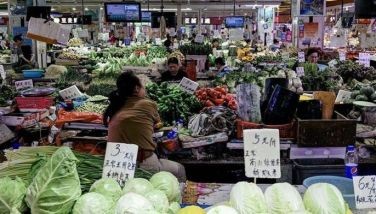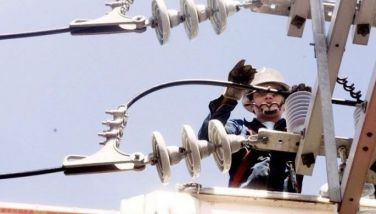OFW remittances

It is no secret that OFW remittances have been a bedrock of the Philippine economy since the Marcos era. It have been a reliable backstop to the economy in many tough situations over the last five decades.
But the situation in the world economy today has become rather different. Countries that had hosted millions of Filipino workers are also feeling the pinch caused by the pandemic and other developments.
The good news is, despite the almost yearlong pandemic, OFW remittances only declined slightly. The full-year 2020 personal remittances, according to the Bangko Sentral, reached $33.194 billion, lower by only 0.8 percent than the $33.467 billion recorded in 2019.
BSP Governor Benjamin Diokno said personal remittances slipped by 0.8 percent, while cash remittances coursed through banks also contracted by 0.8 percent last year, ending 19 consecutive years of growth.
As such, personal remittances, the BSP said, remained a major source of the country’s foreign exchange inflows, with the 2020 level representing 9.2 percent of the gross domestic product (GDP) and 8.5 percent of the gross national income (GNI).
But there are warning signs. Personal remittances from overseas Filipinos started to fall, albeit slightly, by 0.3 percent year-on-year to $3.205 billion in December 2020 from $3.216 billion in December 2019. The decrease was attributed to land-based workers with work contracts of one year or more.
There is more. Host countries are also hurting and under pressure for jobs from their own citizens. In the Middle East, the sharp decline in the price of oil as worldwide demand fell with the pandemic, is causing some countries to reconsider their policies for guest workers.
In Saudi Arabia, the largest employer of Filipino workers, the Saudi Gazette reported that the Minister of Human Resources and Social Development Ahmed Al-Rajhi announced a decision to localize workers in restaurants, cafes, hypermarkets, and malls soon.
The Saudi official said that the number of young Saudi men and women who entered the labor market in January has now exceeded 28,000, and they need jobs.
“We are targeting all sectors, activities, and professions, and we will invest in all opportunities so as to enable the sons and daughters of the country to take up jobs. We will soon implement a decision to localize the legal and educational professions also,” Al-Rajhi said.
All those had not surprised Manny Geslani, a veteran manpower professional. Geslani dismissed the BSP prediction of a four percent rise this year for OFW remittances due to expected higher OFW deployment.
Geslani said OFW remittances are not expected to grow by more than two percent for 2021 to 2022 because deployment of OFWs would remain flat and is not expected to reach 2018 levels of two million workers.
Based on the initial data POEA presented during a Senate budget hearing, the number of deployed workers in 2020 was 1,394,788. That is considerably lower compared to the two million for the entire 2019.
Geslani explained that, for one, the pandemic has pushed many labor markets, like Saudi Arabia, Kuwait, Bahrain, Oman to close their borders. These are the countries where the majority of our domestic workers were deployed in 2018 and 2019. Domestic workers, some 400,000 of them, constituted 70 percent of new hires in both years.
Geslani is not optimistic that economies in the Middle East and Europe will return to normal for the next few years.
In Saudi Arabia, our largest labor market for the past decades, the economic downturn started with the plunge of crude oil prices to below $50 per barrel. COVID-19 exacerbated the slowdown in economic activity, resulting in the repatriation of more than 300,000 Filipinos.
Another 100,000 OFWs are expected to return home in 2021, Geslani estimated. “The rest of around 80,000 to 100,000 out of work have decided to remain in their job sites, supported by unemployment insurance which may last a few more months this year.
There are very few countries which are still open to OFWs like Hong Kong, Taiwan, Japan, Great Britain and Germany, which still need healthcare workers. New destinations like Poland, Czeckolavakia, Serbia are still closed due to the new variant of the COVID-19 spreading to many countries in Europe and the USA.
The other big source of job losses is the cruise ship industry that sent home 120,000 OFWs. Many of the OFWs are still waiting for the major cruise lines in the US to start operating by the second quarter of 2021.
In Europe, very few cruise operators have started their cruises. Less than 20,000 OFWs were recalled late last year. Passenger bookings are still very limited given very strict health and safety protocols.
It is important to watch carefully what happens to OFWs in the next few months. They have powered our consumer driven economy for many years. We need their spending power now, more than ever.
Then again, it is also important to prepare for a waning down of overseas employment, specially for the less skilled. As more and more of the domestic helpers come home, there must be jobs waiting for them here.
That won’t be easy. The country’s unemployment rate of 8.7 percent in October 2020 is equivalent to around 3.8 million jobless Filipinos amid the coronavirus crisis. The latest figure reported by the Philippine Statistics Authority is lower than the 10 percent reported in July and the all-time high of 17.6 percent last April. We are not talking yet of underemployment or the people with jobs who want more work.
Obviously, we will find it difficult to provide enough jobs for returning OFWs. While some may be given some seed capital to start a business, not everyone may be so inclined or ready to become entrepreneurs.
This makes it more urgent for the government to reform investment rules to attract local and foreign capital to invest in job-creating businesses here.
Charter amendments are but one of the many things needed to make the investment climate here competitive with Vietnam and other regional neighbors. But with the next election around the corner, our political leaders will be too distracted to do what is necessary to revive the economy.
Our future may be that of the regional laggard, unless we all wake up.
Boo Chanco’s e-mail address is [email protected]. Follow him on Twitter @boochanco
- Latest
- Trending






























